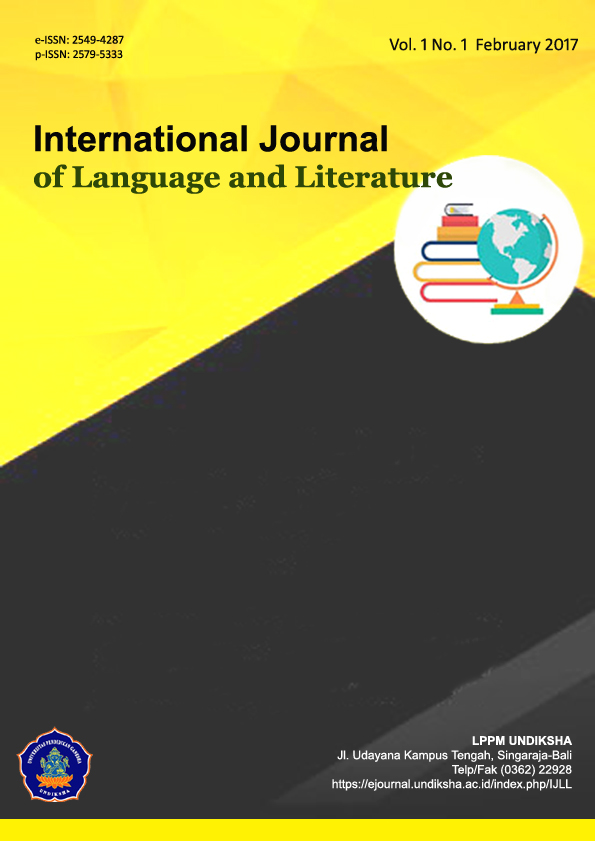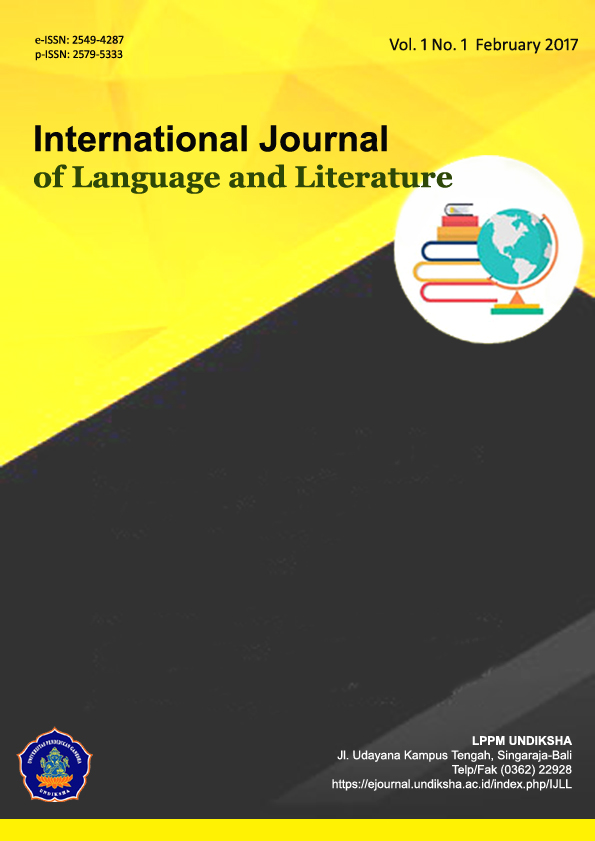STAKE EVALUATION MODEL (COUNTENANCE MODEL) IN LEARNING PROCESS BAHASA INDONESIA AT GANESHA UNIVERSITY OF EDUCATIONAL
DOI:
https://doi.org/10.23887/ijll.v1i1.9615Keywords:
evaluation of learning, stake model (Countenance Model), Bahasa Bahasa Indonesia as character development subject (MPK)Abstract
The evaluation study aimed to describe the implementation of Bahasa Indonesia as character development subject (Matakuliah Pengembangan Kepribadian/MPK) seen from (1) the learning plan, (2) the implementation of learning, and (3) evaluation of learning. Evaluation model used was a stake evaluation model (Countenance Model). Data were analyzed by descriptive-quantitative. The data were collected by using questionnaire, interview, and documentation. Categorization percentage is divided into five criteria, namely excellent (> 80%), good (60%-80%), fairly good (40%-60%), poor (20%-40%), and very poorly (<20%). The research was conducted in the first semester of the academic year 2015/2016 with the sample of 315 students. The results showed that in general the Bahasa Indonesia as character development subject was categorised as good with the percentage of 71.02%, in detail, the result can be described as follows: (1) the learning plan is categorized as good with the percentage of 72.62%, (2) the implementation of learning is categorized as good with the persentage of 69.85%, and (3) evaluation of learning activities is categorized as good with the persentage of 70.59%. The implications of this research for lecturers is a need for efforts to sustain the implementation of learning that has been good even working on improving and working to improve elements of learning activities that have not been considered good. The results of the study suggest that regular evaluation needs to be done to get a better picture of evaluation with a larger number of sample. Another suggestion that can be proposed is the evaluation of learning by using a variety of evaluation model to get a better result of the learning Bahasa Indonesia.
References
Depdikbud. (1998). Undang Undang RI Nomor 2. Tahun 1989 Tentang Sistem Pendidikan Nasional. Jakarta: Depdikbud.
Hamalik, Oemar. (2003). Kurikulum dan Pembelajaran. Jakarta: Bumi Aksara.
Majid, Abdul. (2011). Perencanaan Pembelajaran: Mengembangkan Standar Kompetensi Guru. Bandung : PT. Remaja Rosdakarya Offset.
Pemerintah Republik Indonesia. (2003). Undang-Undang Republik Indonesia No.20 Tahun 2003 tentang Sistem Pendidikan Nasional. Jakarta
Salirawati, Das. (2005). “Persiapan Pembelajaran”. Makalah disampaikan dalam Workshop Strategi Pembelajaran Mahasiswa Jurusan Tadris Fakultas Tarbiyah UIN Sunan Kalijaga di PPPG Kesenian pada tanggal 14 Juni 2005. Dalam https://www.academia.edu/7871077/PERSIAPAN_PEMBELAJARAN. Diakses Diakses 5 Juni 2015.
Surat Keputusan Direktur Jendral Perguruan Tinggi Departemen Pendidikan Nasional Nomor 323/U/2000 tentang Pedoman Penyusunan Kurikulum Pendidikan Tinggi dan Penilaian Hasil Belajar.
Syihabuddin. 2006. “Pembelajaran Bahasa Indonesia sebagai MPK Berbasis Kompetensi”. Jakarta: Direktorat Jenderal Pendidikan Tinggi Departemen Pendidikan Nasional.
Downloads
Published
How to Cite
Issue
Section
License
IJLL Journal provides immediate open access to its content on the principle that making research freely available to the public to supports a greater global exchange of knowledge.

This work is licensed under a Creative Commons Attribution-ShareAlike 4.0 International License








